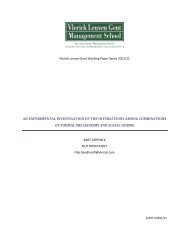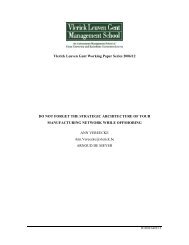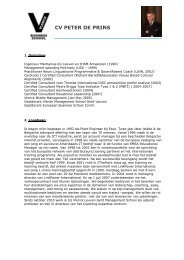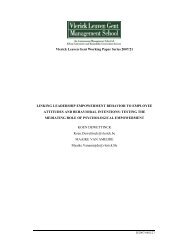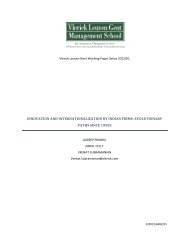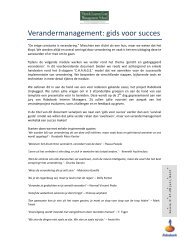Vlerick Leuven Gent Working Paper Series 2007/03 ... - Vlerick Public
Vlerick Leuven Gent Working Paper Series 2007/03 ... - Vlerick Public
Vlerick Leuven Gent Working Paper Series 2007/03 ... - Vlerick Public
You also want an ePaper? Increase the reach of your titles
YUMPU automatically turns print PDFs into web optimized ePapers that Google loves.
Proposition 4 : the greater the conflict norms, the stronger the relationships<br />
between board size, independence, diversity and debate<br />
Indirect effects of board characteristics: the board processes-task performance link<br />
The strategic as well as the control role of the board include complex and interactive<br />
tasks which require a minimum level of interpersonal attraction, or cohesiveness, among the<br />
board members in order to perform these tasks effectively. In particular, the performance of<br />
these tasks depends on mutual trust and professional respect and this is more difficult to<br />
sustain when boards are more fragmented (Forbes and Milliken, 1999). Genuine collegiality<br />
in the boardroom is required which breathes confidence that board members are respectful<br />
listening to each other point of view and are committed to working through the board tasks in<br />
a collective way. Empirical research on other groups has already found a positive relationship<br />
between cohesiveness and performance outcomes (Cohen and Baily, 1997). Higher cohesive<br />
or integrated groups experience higher levels of member satisfaction (Bettenhausen, 1991), a<br />
higher productivity (Shaw, 1976) and a lower turnover rate (O’Reilly et.al., 1989).<br />
Still, it can be argued that the impact of cohesiveness on board task performance is not<br />
simply linear. In fact, group studies have demonstrated that a high level of cohesiveness may<br />
lead to a pressure to conform with group standards and a striving for unanimity at the expense<br />
of critical thinking and questioning of assumptions, a phenomenon known as ‘groupthink’<br />
(Janis, 1983). Also boards of directors may be vulnerable to the danger of groupthink to the<br />
extent politeness and courtesy is emphasized over critical oversight and quality strategic<br />
decision-making (Jensen, 1993). In this respect, board members are failing to examine<br />
alternatives, to be either self-critical or critical to others, and being selective in gathering<br />
information (Bainbridge, 2002). Based on these assumptions, we advance the following<br />
propositions:<br />
Proposition 5 : the effect of cohesiveness on board task performance will be positive<br />
but when cohesiveness is too high, the impact on board task performance may be<br />
negative<br />
As noted before, in most boards, directors are faced with complex strategic and<br />
monitoring issues.<br />
22



